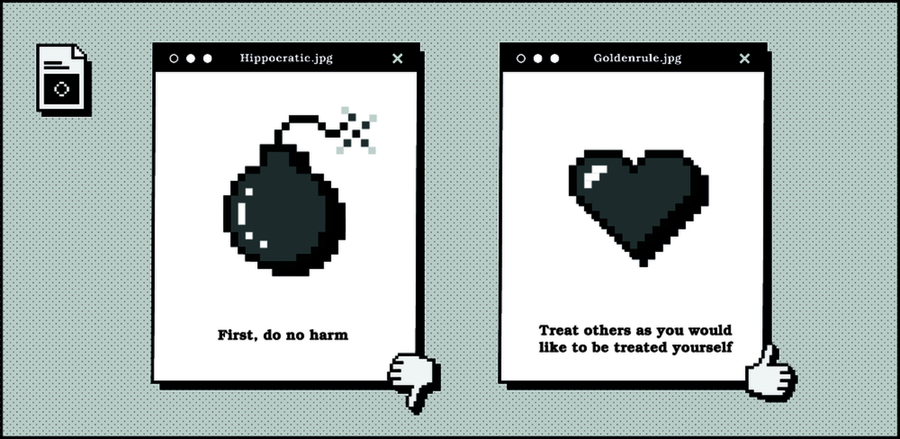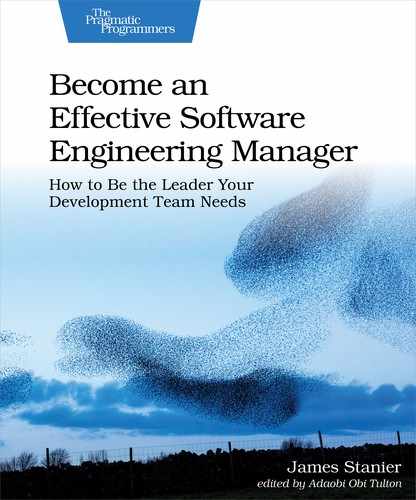Spies and Gatekeepers
Take a moment and consider a piece of confidential information. What comes to mind? A redacted dossier leaked from the FBI? The inside of Area 51? The salary information of your direct reports? As a manager, you’re going to have access to all sorts of sensitive information, whether you like it or not. In your one-to-ones, you’ll talk about confidential topics, professional and personal. In addition to this, due to your position as a manager, others may divulge secrets to you as they know that they can come to you in confidence. Or worse, they may spread rumors to attempt to curry favor.
Before we dive into learning about how to share just enough information and how to handle workplace politics, let’s look at two concepts related to information in order to glean some insights into how you should think about the information that you collect as a manager.
Let’s start with a sexy topic: espionage. Spies are cool, right? James Bond escapes the exploding train via the window with merely seconds to spare, clutching the laptop that’s storing the nuclear launch code. Ethan Hunt scales the Burj Khalifa while being battered by heavy crosswinds. But what actually is spying? According to Wikipedia, espionage is the act of obtaining secret or confidential information or divulging of the same without the permission of the holder of the information. It’s a high-risk, high-reward activity.
Although you may not find yourself abseiling down the Hoover Dam or hacking into the mainframe of the CIA any time soon, as a manager you do have some similarities with spies, insofar that you do obtain and handle sensitive information that is of the utmost importance. It just might not be as important as the nuclear codes. Although it may seem bizarre to compare ourselves with spies, by doing so we can highlight some important points:
-
We should never attempt to obtain information without the permission of the holder of the information.
-
We should never attempt to obtain information for the benefit of another party.
-
We should never attempt to obtain information using deceitful means.
But hang on, doesn’t all of this sound entirely obvious? Well, yes. Perhaps it does when you read it. But isn’t it tempting sometimes? Once I was accidentally sent a spreadsheet from Finance containing the salary information of everyone in the engineering department, rather than the filtered version showing only my teams. What did I do? I told them what they’d done and deleted the spreadsheet without opening it. I didn’t have permission to see that, despite having been sent it. You may find yourself in similar situations, and you’ll need to remember not to be a spy.
The inverse is also true. People may try to extract information from you for their own gain or for other’s gain. Be careful of conversations after work at the bar. Be aware of others who may try to pry to find out various pieces of secondary information that they can piece together to infer what they really want to know. Just be cautious.
OK, enough negatives. Is there a better model that you can use to understand how you should operate with information? Fortunately there is. Let’s consider the process of gatekeeping in communication. Much like a gatekeeper would control access to the gate of an ancient city, gatekeeping is the action of filtering information for further distribution. Typically it represents how information is filtered by the media before it is presented to the public. This happens at many levels, from journalists picking exactly which aspects of stories to cover, through to particular purposeful biases that selected media outlets may have. Stories may be selected due to their impact, content, familiarity to the public, and their proximity (think local versus global news).
Although you may not be running a global media conglomerate, you do have access to information. You do choose how and when to broadcast that information and to whom. As a manager, you need to act as gatekeeper. You have to:
- Decide what information should be heard by which parties.
- Decide when that information should be shared.
- Decide how that information should be framed.
You’ll see this play out in all manner of situations in varying levels of impact. You may have to choose the right time and the right way to tell someone that you’re going to be letting them go. You’ll have to pick the right moment and message to let the team know that their project is being paused so they can work on something that the company deems more important. You’ll have to consider how best to handle the message that the business has had a terrible year and it’s looking likely that there are going to be redundancies.
How should you operate as a gatekeeper? No situation or piece of information is the same. This is why you need rules. In the next section we will look at how to share just enough information, but before we get stuck into that, there are two rules that you should abide by when it comes to dealing with all information. Both are simple and both have been around longer than we’ve been on this planet.
-
The Hippocratic Oath: an oath of ethics historically taken by doctors, shortened here to the following succinct phrase: first, do no harm.
-
The Golden Rule: an ethic that is the basis of a number of religions and cultures: treat others as you would like to be treated yourself.
When handling any information, if you remember the rules above, you’ll get most of the way there. But let’s take a deep dive into the nuances of handling information.

